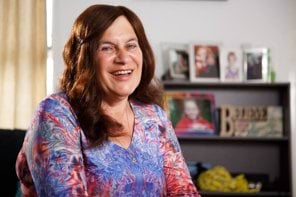
- Inducted:
- 2016
Angela Clarke was a Gunditjmara woman who had a significant impact on the well-being of the Victorian Aboriginal community and on communities across Australia. She was a quiet achiever, passionate about empowering Aboriginal people. Angela was born in Melbourne and her memories of her early life in Fitzroy were shaped by her strong relationships with her Maltese father and her Gunditjmara grandparents Nin and Pop Clarke, who cared for her while her dad was at work.
Angela was devastated when her father died. She was in her early teens at the time and left high school after completing year 10. In the following years she did waitressing, bar work, worked in a bakery and in family day care.
In the early 1980s, Angela was a single mother supporting her 3 children Ricky, Amy, and David. She was juggling 3 jobs and also studying part-time. Angela was naturally drawn to working in community development and her work included empowering migrant women, advocating for low-income public housing tenants, and teaching basic skills to unemployed young people.
Hunger for advocacy
Working with the Action Resource Centre exposed her to another world, and she developed a ‘hunger for advocacy’ on behalf of people struggling to survive on low incomes. She completed an Associate Diploma and then a Bachelor degree in Community Development. In later years she also completed a Masters of Public Health degree, studying at the Institute of Koorie Education, Deakin University.
In 1994 Angela was appointed as Koorie Hospital Liaison Officer at the Royal Children’s Hospital in Parkville. These positions had been introduced in 1982, following a recommendation to the Victorian Minister for Health by the Victorian Working Party on Aboriginal Health to create these positions in hospitals across the state. The aim was to tackle some of the barriers that prevented Aboriginal Victorians from accessing health services.
Cultural health is central to Aboriginal well-being
There had been 4 liaison officers at the Royal Children’s Hospital before Angela was appointed. Working in isolation and physically located in inaccessible offices, their effectiveness was hampered by a lack of understanding within the hospital of the barriers preventing Aboriginal patients and their families from fully accessing hospital services. Angela applied a holistic approach to the health of Aboriginal patients and their families, recognising that cultural health is central to Aboriginal well-being. With support from the hospital’s Chief Social Worker, she made strategic changes, including the appointment of 2 additional Koorie Liaison Officers at the hospital.
Angela worked to change hospital practice to ensure Koorie Liaison Officers were able to ‘walk with Aboriginal families’ on their journey at the hospital and for this to be incorporated into everyday practice, across all hospital departments. The Liaison Workers also invested significant time into educating hospital staff and trainees about culturally appropriate practice for Aboriginal patients and their families.
Transforming the way hospital services were offered to Aboriginal families
Together with her co-workers, Neville Austin and Shawana Andrews, Angela documented the development of the liaison service in Looking after our Own - Supporting Aboriginal families through the hospital experience. This ground breaking publication set out a clear historical background to the barriers to Aboriginal access to hospital services and served as a blueprint for other Koorie Liaison Officers. This helped to transform the way hospital services were offered to Aboriginal families across Victoria. In 1999 Angela was appointed Deputy Director of the VicHealth Koorie Health Research and Community Development Unit (later called Onemda) at the University of Melbourne. Taking a team approach she was determined that the voices of the Koorie community should be central to both research and outcomes in health initiatives.
As part of the Onemda team, Angela made sure that research projects undertaken would be respectful, inclusive and have meaningful outcomes for the Koorie community. One of the many projects she greatly enjoyed was travelling throughout Victoria with Aunty Joan Vickery AM, gathering oral history stories of Elders who had played crucial roles in establishing Aboriginal community-controlled health services in the 1970s and 1980s.
Success of community-controlled health services
These stories were later published as Nyernila Koories Kila Degaia – Listen up to Koories Speak about health, documenting this important movement and describing the reasons for the success of community-controlled health services in tackling Aboriginal health issues at a grass roots level.
Angela’s implicit understanding of the crucial connections between culture and identity for Aboriginal people also influenced her work as an Elder on the Koorie Courts. She was a board member of a number of Koorie organisations over the years, including the Victorian Aboriginal Health Service, Aboriginal Community Elders Services, Ilbidjerri Theatre Company and the Koorie Heritage Trust.
She resigned from her position as Chairperson of the Koorie Heritage Trust in 2013 because of serious illness. Always committed to nurturing the voices of others, Angela carried out her professional and voluntary work through collaboration. Her strong work ethic set an inspiring example for her children, grandchildren, as well as countless others. Angela was always a quiet achiever, preferring to let the legacy of her work speak for itself.
Updated

